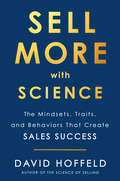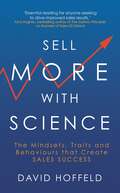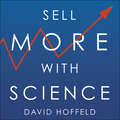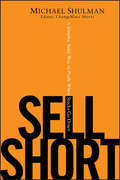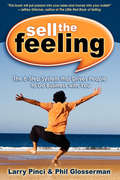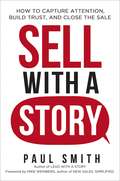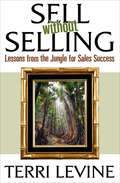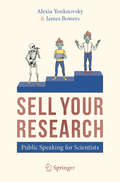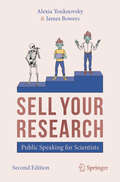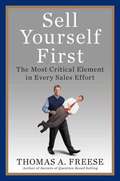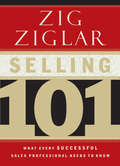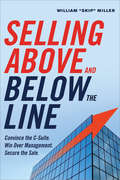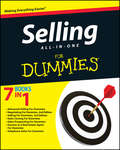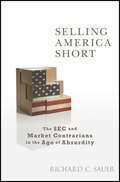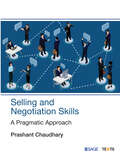- Table View
- List View
Sell More with Science: The Mindsets, Traits, and Behaviors That Create Sales Success
by David HoffeldThe groundbreaking system scientifically proven to increase your performance and launch you to unprecedented levels of success.Today, in sales, business, and life, you need every advantage you can get. In Sell More with Science, David Hoffeld, the world&’s leading expert on applying science to selling, shares his revolutionary three-part system to experience surefire success at home, at work, and out in the world. Here, Hoffeld utilizes research studies from social psychology, neuroscience, and behavioral economics to reveal actionable insights you can use to grow your sales, achieve more, and stay ahead of the competition. You&’ll discover: • two evidence-based mindsets that will help you earn more sales • seven strategies that will boost your chances of reaching any goal • powerful principles that will enhance your ability to guide potential clients into positive buying decisions • ways to win day-to-day interactions—in business and beyond • how to reframe any idea or situation • what it means to sell with integrity • a science-backed formula you can follow to create positive career change • and much more Filled with practical insights and exercises, Sell More with Science is a game-changing guide for anyone who wants to take their influence, sales, or career to new heights.
Sell More with Science: The Mindsets, Traits and Behaviours That Create Sales Success
by David HoffeldThe groundbreaking system scientifically proven to increase your performance and launch you to unprecedented levels of success.In sales, you need every advantage you can get. In SELL MORE WITH SCIENCE, world-leading expert, David Hoffeld, applies science to selling, sharing his revolutionary three-part system for sure-fire sales success at home, at work, and out in the world.SELL MORE WITH SCIENCE utilizes research studies from social psychology, neuroscience and behavioral economics to reveal actionable insights you can use to grow your sales, achieve more, and stay ahead of the competition. You'll discover: - Two evidence-based mindsets that will help you earn more sales - Seven strategies that will boost your chances of reaching any goal - Powerful principles that will enhance your ability to guide potential clients into positive buying decisions - Ways to win day-to-day interactions - in business and beyond - How to reframe any idea or situation - What it means to sell with integrity - A science-backed formula you can follow to create positive career change - And much more Filled with practical insights and exercises, SELL MORE WITH SCIENCE is a game-changing guide for anyone who wants to take their influence, sales, or career to new heights.
Sell More with Science: The Mindsets, Traits and Behaviours That Create Sales Success
by David HoffeldThe groundbreaking system scientifically proven to increase your performance and launch you to unprecedented levels of success.In sales, you need every advantage you can get. In SELL MORE WITH SCIENCE, world-leading expert, David Hoffeld, applies science to selling, sharing his revolutionary three-part system for sure-fire sales success at home, at work, and out in the world.SELL MORE WITH SCIENCE utilizes research studies from social psychology, neuroscience and behavioral economics to reveal actionable insights you can use to grow your sales, achieve more, and stay ahead of the competition. You'll discover: - Two evidence-based mindsets that will help you earn more sales - Seven strategies that will boost your chances of reaching any goal - Powerful principles that will enhance your ability to guide potential clients into positive buying decisions - Ways to win day-to-day interactions - in business and beyond - How to reframe any idea or situation - What it means to sell with integrity - A science-backed formula you can follow to create positive career change - And much more Filled with practical insights and exercises, SELL MORE WITH SCIENCE is a game-changing guide for anyone who wants to take their influence, sales, or career to new heights.(P) 2022 Penguin Audio
Sell Now!: Adaptive Strategies for Today's Changing Marketplace
by Stacia Skinner Brandon Yusef ToropovWith the volatile economy, budgets are tight and expectation for increased revenue is higher than ever. Old sales strategies aren’t cutting it in this tough market. Veteran sales trainer Stacia Skinner and Brandon Toporov provide game-changing techniques proven effective for getting and keeping new business and expanding the business in your existing client base.
Sell Now!
by Stacia Skinner Brandon Yusef ToropovAdaptive Strategies for Today's Changing Marketplace
Sell Online Like a Creative Genius: A Guide for Artists, Entrepreneurs, Inventors, and Kindred Spirits (Like a Creative Genius #1)
by Brainard CareyHow to sell art or anything else online without leaving your home. Whether you’re selling original artwork, jewelry, or a unique product, this is the book for you. Brainard Carey offers advice with solid examples of how building an online business is something every creative person can pursue. Carey draws from his extensive experience and interviews with others to show artists and creative people how to sell their work independently and efficiently. Readers will learn how to establish an online store, develop a presence, promote their goods, and reach customers. Chapter topics include: Designing a website or profile on an existing site Effective marketing strategies Creative ways to advertise your product Building your social media following Finding new customers Real examples of artists and entrepreneurs who succeeded in selling their work online And much more With chapters divided between practical how-tos and case studies, Sell Online Like a Creative Genius™, offers readers both instructive and demonstrative lessons in making their small online business a reality. Everyone can do it with the right tools, and Carey offers an insider’s guide to an otherwise daunting process.
Sell & Re-Sell Your Photos: Learn How to Sell Your Photographs Worldwide
by Rohn Engh Mikael KarlssonSell your photos again and again! Live anywhere. Pick your hours. Be your own boss. Earn more money. See your pictures in print. Discover the freedom of a profitable photo business by learning the secrets behind making and selling editorial stock photography. For more than three decades, industry classic Sell & Re-Sell Your Photos has been giving new and veteran photographers the tools to sell their pictures consistently to markets they enjoy. Rohn Engh's master text, with updates from independent photographer Mikael Karlsson, outlines the time-tested formula for successfully marketing your work to publishers world-wide. This completely revised and expanded 6th edition features up-to-date advice, brand new photos and charts and tables to help you achieve your goals. Learn how to:Create enduring images--the ones photo buyers always needPrice your photos like a professionalFind your niche and corner that marketTake and market your work with modern technologyConfidently submit to agencies and publishersDigitally store your archiveProtect yourself and your photos with basic copyright laws and regulationsIncludes a detailed five-week action plan to get you organized and sellingMaster the stock photography market: Take pictures today that you can sell for many tomorrows to come!
Sell Short: A Simpler, Safer Way to Profit When Stocks Go Down
by Michael ShulmanIn Sell Short, author Michael Shulman demystifies the art of short-selling and reveals how investors can successfully use this approach to profit from busted stocks in both up and down markets. <P><P>Sell Short provides readers with a comprehensive overview of how to capture significant profits with this method by implementing put options in their investment program. And while Shulman focuses on shorting company stocks, he also offers tools and techniques for shorting markets and indices, specific sub-segments of the market, real estate (through REITs), and commodity plays. Filled with real-world examples and detailed case studies, this reliable resource will show readers how money can be made when taking the short side of a trade. Michael Shulman (Rockville, MD) is the Editor of ChangeWave Shorts, a weekly newsletter from InvestorPlace Media that educates and informs readers on short-selling stocks.
Sell the Feeling: The 6-Step System that Drives People to Do Business with You
by Larry Pinci Phil GlossermanSell the Feeling has a crucial message for anyone who wants to attract more clients, customers, or repeat business: "People buy based on feelings." Sell the Feeling shows readers how evoke the essential feelings that motivate people to do business. It is the first book of its kind that deals with the critical role of feelings in the selling and buying process. Sell the Feeling lays out a simple six-step process of influence for salespeople, advisors, and professionals--even those who don't consider themselves in sales. Written as an entertaining and inspiring story and illustrated with off-the-wall cartoons, this book makes the process easy to grasp and retain. Many professionals are hindered by their own negative emotions and attitudes about selling. Sell the Feeling shows readers not only how to master their buyers' psychology, but how to master their own "inner game" of selling. Sell the Feeling is destined to become a classic work on sales and influence.
Sell: Trust-Based Professional Selling
by Thomas N. Ingram Raymond W. LaForge Ramon A. Avila Charles H. Schwepker Michael R. WilliamsMaster today's most effective professional selling concepts and skills with SELL, 7E by 4LTR Press. Updated, streamlined chapters cover the most relevant topics and current industry selling practices. This edition covers recent technology, including artificial intelligence, for use in the selling process. New or expanded coverage addresses storytelling in sales, customer engagement and the customer experience. This edition's visual presentation is complemented with new chapter-opening vignettes and new coverage of the latest ethical dilemmas and virtual selling strategies. Study tools and activities like case studies and role play videos help you prepare for real-world situations. MindTap digital resources let you read or listen to chapters and study with flashcards and practice quizzes. When it's time to review, you can easily gather everything you've flagged or noted into a guide you organize. Track your scores so you know where to focus efforts to reach your learning goals.
Sell with a Story: How to Capture Attention, Build Trust, and Close the Sale
by Paul Smith Mike WeinbergDespite all the high-tech tools available to salespeople, the most personal method still works best.Storytelling packs the emotional punch to turn routine presentations into productive relationships. It explains products or services in ways that resonate; it connects people and creates momentum. Stories speak to the part of the brain where decisions are made.Paul Smith, author of the acclaimed Lead with a Story, shifts his best-selling formula to the sales arena. In Sell with a Story, he identifies the ingredients of the most effective sales stories and reveals how to:Select the right storyCraft a compelling and memorable narrativeIncorporate challenge, conflict, and resolutionUse stories to introduce yourself, build rapport, address objections, add value, bring data to life, create a sense of urgency, and moreComplete with model stories, skill-building exercises, and enlightening examples from Microsoft, Costco, Xerox, Abercrombie & Fitch, Hewlett Packard, and other top companies, this powerful and practical guide gives you the tools you need to turn your experiences into stories that sell.
Sell Without Selling: Lessons from the Jungle for Sales Success
by Terri Levine&“Her colorful and descriptive narrative lays out one of the classic truths of sales: Sell yourself sincerely before trying to sell anything else&” (The Home-Based CEO). Sell without Selling is a delightful fable that tackles the issue many salespeople face daily—in their hearts they hate to sell. It instantly engages anyone who sells with the story of a young business student named Christina and her struggle to learn a way to sell with ease. In the Krenker Business School of Practical Sales Advice, she learns that while sales methods have changed, good sales tactics have not. There, she learns to say goodbye to the hard sell and opens her eyes and ears to selling without selling. Entrepreneurs, solo-preneurs, small-business owners, sales executives, managers, and sales people need this highly effective yet simple story to show them how to create more sales while giving up the sales &“tricks&” that won&’t work with today&’s savvy buyers. Times have changed and to generate sales, you must, too! What you&’re about to read might buck the trend, but it sure works! Find out for yourself. Buy and read Sell without Selling today! Praise for Terri Levine&’s Turbo Charge: &“This brilliant must-read book provides the keys to the new era. It&’s priceless for those who want to transform their business as a Heart-repreneur®.&” —Dr. Joe Vitale, author of Attract Money Now &“It is, simply stated, the best book on entrepreneurship that I have ever read. When Terri speaks hearts are opened.&” —Forrest Willett, #1-bestselling author of Baseballs Don&’t Bounce
Sell Your Business for an Outrageous Price: An Insider's Guide to Getting More Than You Ever Thought Possible
by Kevin ShortToo many businesses sell for far less than they should! After pouring time, energy, and money into their company, owners deserve to squeeze every last dollar they can from that hard-earned investment. Sell Your Business for an Outrageous Price is the playbook they need to win big at the closing table. Readers will discover how to: Prepare their companies and themselves for sale * Recognize the best time to go to market * Minimize their risk * Identify, attract, and motivate deep-pocketed buyers * Determine their company's competitive advantage and leverage it for the best offer * Find a transaction advisor with the skills and experience to guide them through the M&A jungle * Ascertain whether the advisor has what it takes to get top dollar * Maintain confidentiality * Foil buyers' attempts to undermine sale price * And much more Featuring real-life case studies and an appendix of indispensable tools--including due diligence lists, sample nondisclosure agreements, a sales readiness assessment, and a sample engagement letter--this insightful guide reveals how anyone can get a positively outrageous price for their company.
SELL YOUR RESEARCH: Public Speaking for Scientists
by Alexia Youknovsky James BowersPublic speaking is an essential component in the life of a scientist, whatever your level of career. In this book, the authors describe a tried-and-tested technique for preparing a presentation: the SELL Method. Following these three simple steps - Skeleton, Envelope, Life & Logistics - will help you make the most out of any talk. Whether it be a 3-minute pitch or an hour-long plenary session, you will find pages of advice, theory and practical exercises enabling you to SELL YOUR RESEARCH with impact.For scientists these days, the work is not done until it is communicated. And now that problem is solved. Solidly researched and immaculately written, Sell Your Research is a goldmine of useful advice. Whether you are brimming with confidence or just setting out, this gem of a guidebook will improve every presentation and nurture every budding science communicator.Dr. Stephen Webster, Director of Science Communication Unit, Imperial College LondonPublic speaking is one of the most intimidating but crucial tasks in a scientist’s career. This book provides a welcoming, clear, step-by-step guide to improving your presentations at every level. Reading it and following its advice will make your science talks less frightening and more enjoyable. Dr. Laura Helmuth, Health, Science & Environment Editor, Washington Post
SELL YOUR RESEARCH: Public Speaking for Scientists
by Alexia Youknovsky James BowersPublic speaking is an essential component in the life of a scientist, whatever your level of career. In this book, the authors describe a tried-and-tested technique for preparing a presentation: the SELL method. Following these three simple steps—Skeleton, Envelope, and Life and Logistics—will help you make the most out of any talk. Whether it be a 3-minute pitch or an hour-long plenary session, you will find pages of advice, theory, and practical exercises enabling you to Sell Your Research with impact. This second edition is enriched with new insights in storytelling, online presenting, and speaking with the media on hot topics. For scientists these days, the work is not done until it is communicated. And now that problem is solved. Solidly researched and immaculately written, Sell Your Research is a goldmine of useful advice. Whether you are brimming with confidence or just setting out, this gem of a guidebook will improve every presentation and nurture every budding science communicator. Dr. Stephen Webster, former Director of Science Communication Unit, Imperial College London Public speaking is one of the most intimidating but crucial tasks in a scientist’s career. This book provides a welcoming, clear, step-by-step guide to improving your presentations at every level. Reading it and following its advice will make your science talks less frightening and more enjoyable. Dr. Laura Helmuth, Editor In Chief, Scientific American
Sell Yourself!
by Michael I. Norton Thomas SteenburghHelps students develop an effective sales pitch for their greatest asset--themselves. Also, broadens their understanding of how salespeople sell products and services. Before class, students are asked to interview a potential employer and to develop a preliminary sales pitch. Once in class, students work through an exercise that helps them refine the sales pitch and better understand several key marketing principles. Leads to an engaging and thought-provoking discussion.
Sell Yourself!
by Michael I. Norton Thomas SteenburghHelps students develop an effective sales pitch for their greatest asset--themselves. Also, broadens their understanding of how salespeople sell products and services. Before class, students are asked to interview a potential employer and to develop a preliminary sales pitch. Once in class, students work through an exercise that helps them refine the sales pitch and better understand several key marketing principles. Leads to an engaging and thought-provoking discussion.
Sell Yourself First
by Freese Thomas A.Today more than ever, the biggest thing that separates you from your competitors is you. According to Thomas A. Freese, whose Question-Based Selling system has been adopted and implemented by thousands of salespeople in companies all over the world, YOU are the biggest differentiator between you and your competitors. Given the current business climate, sellers should no longer count on their product or service to sell itself because their toughest competitors are out there with similar products they claim are better. Instead, it's more likely that in closely contested sales, the decision will come down to whichever salesperson offers the best service, is the most responsive, or displays any number of other highly intangible attributes, such as credibility, expertise, helpfulness, and integrity. The challenge for sellers is to convey these qualities in a way that promises value to customers. Freese explains how to maximize a value proposition and ultimately win more sales through strategies that include: ? managing conversational dynamics ? influencing the customer's buying criteria ? justifying costs ? creating curiosity about your product .
Selling: Building Partnerships
by Stephen B. Castleberry John F. TannerSelling: Building Partnerships 9e remains the most innovative textbook in Selling with its unique role plays, mini-cases, and focus on knowledge and skills critical to the partnership process and successful business professionals. Emphasized throughout is the need for salespeople to be flexible and adapt strategies to customer needs, buyer social styles, and other relationship needs and strategies. This is followed by thorough discussion of the salesperson as manager and how planning and continual learning enable effective selling and career growth. This market-leading textbook has been recently updated to include McGraw-Hill's Connect and SmartBook (available Summer 2016).
Selling: Building Partnerships
by Stephen B. Castleberry John F. TannerSelling: Building Partnerships, 11e remains faithful to the original goal of the product since its first edition-- that instructors don’t want to teach the history of selling, rather they want their students to know how it is done. While many things have changed in sales, such as the changing roles for technology and the increased use of multichannel go-to-market strategies, students still need to practice their newly learned skills, make ethical choices, and adapt their skills to their audience. Selling; Building Partnerships addresses all of these with distinct roleplays, mini case studies, and current examples throughout. The products’ emphasis on value creation makes it appropriate not only for students pursuing a sales career, but also those who seek these skills for other roles in life and business.
Selling 101: What Every Successful Sales Professional Needs to Know
by Zig ZiglarHere in a short, compact and concise format is the basics of how to persuade more people more effectively, more ethically, and more often. Ziglar draws from his fundamental selling experiences and shows that while the fundamentals of selling may remain constant, sales people must continue learning, living, and looking: learning from the past without living there; living in the present by seizing each vital moment of every single day; and looking to the future with hope, optimism, and education. His tips will not only keep your clients happy and add to your income, but will also teach you ideas and principles that will, most importantly, add to the quality of your life. Content drawn from Ziglar on Selling.
Selling Above and Below the Line: Convince the C-Suite. Win Over Management. Secure the Sale.
by William Skip" MillerCost, service, functionality—good salespeople know the value propositions that speak to frontline managers. But there’s another crucial player in the buying decision, with an entirely different set of criteria. Top-level executives evaluate proposals from an “above the line” perspective: ROI, time saved, risk lowered, productivity improved. Sales professionals that appeal to both achieve spectacular results. In Selling Above and Below the Line, master sales trainer Skip Miller shows how to simultaneously sell the technical and financial fit of any product or service—a strategy used by Google, Apple, Cisco WebEx, and other powerhouses. Readers learn to: Create energy by including executives early in the sales process • Ask the right questions and pinpoint big-picture financial needs • Keep “below the line” managers from feeling bypassed • Uncover value propositions that target each set of decision-makers Too often, sales that seemed locked in will stall or go dark. Learn to sell above and below the line, and keep the process moving swiftly toward successful, lucrative deals.
Selling All-in-One For Dummies
by Consumer DummiesTried-and-true information and tips for selling like a proAre you looking to enter the world of sales, or are you already a salesperson who's looking for new tips and tactics to expand your business? Whether you're in charge of your own selling career or you're responsible for training and managing a professional sales force, Selling All-In-One For Dummies features everything you need to know to improve your results.This valuable selling resource includes new ways to effectively network and prospect through the power of all the social media networking sites such as LinkedIn, Twitter, and Facebook, as well as ways to optimize sales success through Webinars; the latest tips and advice to build an appealing image; proven questioning methods that close sales; updated advice on keeping clients' business and building their loyalty; and how to adapt presentations and techniques. Proven methods and techniques that will lead to bigger sales and more loyal customersAdvice on separating yourself from the packPlus four chapters on selling in specialized areas from biotechnology to real estateSelling All-In-One For Dummies is the authoritative guide to navigating the ever-changing and growing sales arena.
Selling America Short
by Richard C. SauerAn industry insider reveals the inner workings of our financial system and the agencies who attempt to control itDuring his dozen years as an SEC attorney, author Richard Sauer opened and supervised some of its most notable financial cases-investigations that took him to a dozen countries and returned hundreds of millions of dollars to American investors. While a partner at a major law firm and, later, a hedge fund manager, he saw firsthand the follies and failures of our system. Now, in Selling America Short, he shares his extraordinary experiences with you.Selling America Short is a gripping chronicle of crooked companies, financial philanderers and hapless enforcers told through the eyes of personal experience. Page by page, it shows the damage wrought by the deep biases and lack of worldly experience common among those who hold the reins of our capital markets.Sheds light on the inner workings of our financial systemTakes you on a fascinating journey of a rogue's gallery of crooked executives, professional fraud enablers, and squirrelly technocratsOffers a firsthand account of the many ways contrarian views of public companies are suppressed and punished, depriving the market of critical information With the capital markets in turmoil, people are fascinated with what is happening on Wall Street. This book provides a unique look at the forces and events that led directly to financial tragedy and continue to wreak havoc.
Selling and Negotiation Skills: A Pragmatic Approach
by Prashant ChaudharyAn indispensable companion to every student and professional who hopes to master the art of negotiation and selling. In today's challenging business environment and transforming consumer behaviour, selling and negotiation skills are paramount in gaining competitive advantage and to drive success. This comprehensive yet concise book dwells upon these critical skills at large, covering the varied sales approaches and strategies along with negotiation styles and tactics. The text is interspersed with numerous illustrative examples from diverse real-life situations for an easy understanding of the subject. Written in a simple, lucid language and filled with essential tools and helpful tactics, Selling and Negotiation Skills: A Pragmatic Approach simplifies the whole negotiation process to achieve a win-win situation for everyone. The book's practical and highly effective framework aims to help the readers harness the much-needed selling and negotiation skills to their advantage. Key Features • Complex concepts elaborated through innovative examples, tables and schematic diagrams • Illustrations from mythology, movie scenes and simulated role plays • Caselets in each chapter; three major case studies from international affairs, diplomatic dialogues and war-based negotiations
